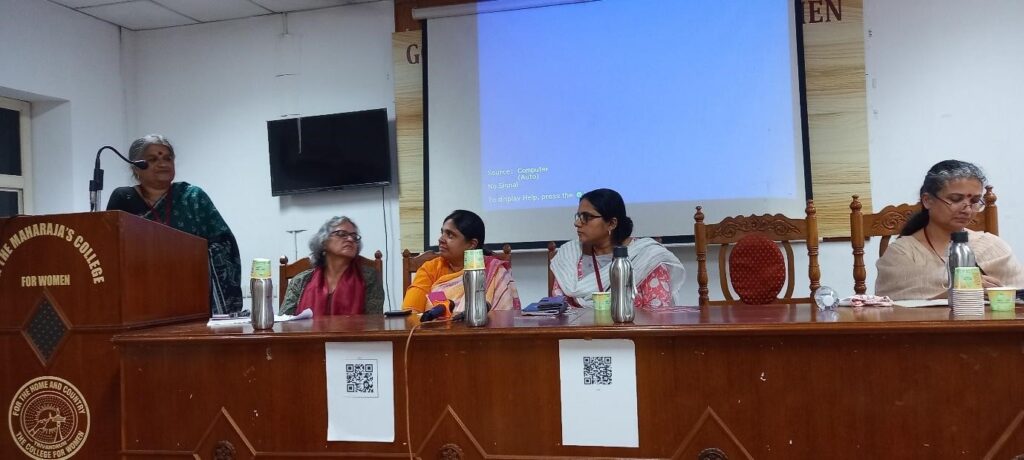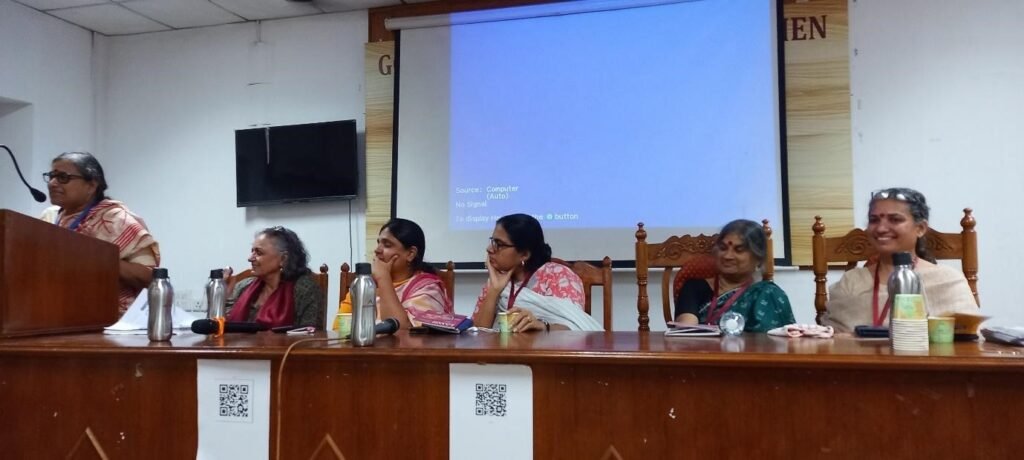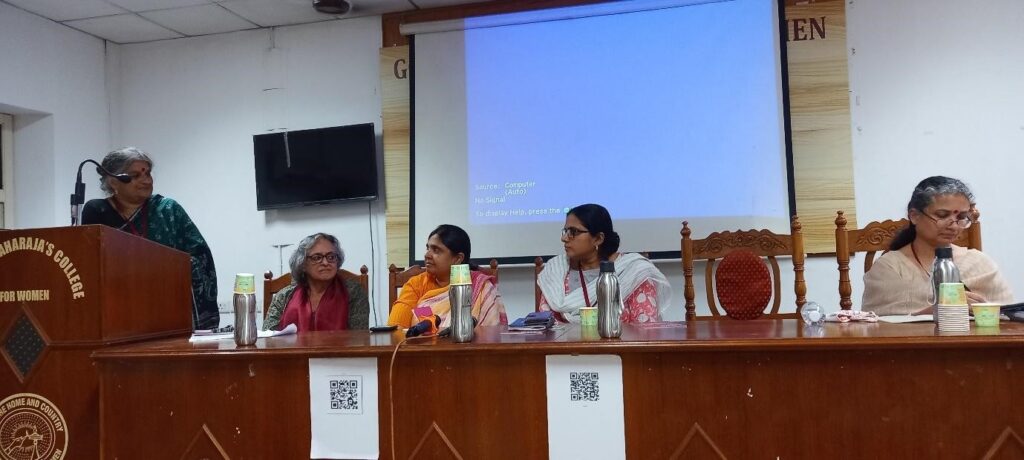Institute for What Works to Advance Gender Equality (IWWAGE) and Indian Association for Women’s Studies (IAWS) panel on Strengthening the Voices of Care Workers in India

On 7th September, 2023, Institute for What Works to Advance Gender Equality (IWWAGE) collaborated with the prestigious Indian Association for Women’s Studies (IAWS) as a part of their 17th National Conference held in Thiruvananthapuram, Kerala (7th – 10th September 2023). The crucial panel discussion was held on one of the emerging issues of women workers in the insidious and rarely recognised sector of the economy – the care sector. The panel aimed to discuss mechanisms to strengthen the voices of such workers and aims at contributing to policies for their welfare.
The session was chaired and moderated by Ritu Dewan (Vice President, Indian Society of Labour Economics (ISLE)). The panel was introduced by Bidisha Mondal (Research Fellow, IWWAGE-LEAD at Krea University), where the panellists were Dipa Sinha (Assistant Professor, School of Liberal Studies, Ambedkar University Delhi), Sonia George (General Secretary, Self Employed Women’s Association (SEWA) in Kerala), Kiran Moghe (Member, All India Democratic Women’s Association (AIDWA)) and AR Sindhu (General Secretary, All India Federation of Anganwadi Workers and Helpers (AIFAWH)). The concluding remarks were given by Ishita Mukhopadhyay (President, IAWS).
The discussion centred on the growing significance of care work and care workers, particularly in rural India, where they form the largest group of frontline workers employed by the State. With a diverse range of care workers in the country, spanning from unpaid to underpaid, working for the public and private sectors, households, or even within their own families, the panellists highlighted the pressing challenges these workers still face today. Women, particularly those serving as frontline workers such as Aanganwadi workers, ASHA workers, Auxiliary Nurse Midwives (ANMs), mid-day meal workers etc., play a vital role in providing essential services to rural communities. Despite their substantial contributions to various human development outcomes and being responsible for the generation of 25-30% of India’s GDP (sic), the State does not officially recognize them as ’employees’; instead, they are often referred to as ‘scheme’, ‘voluntary’, or ‘honorary’ workers. They dedicate approximately 4 to 6 hours a day to their responsibilities, leaving them with little time to pursue other forms of employment. This lack of recognition is compounded by meagre compensation, which falls below the minimum wage and underscores the undervaluing of their work. In the country, only 14 states have officially established minimum wage rates for domestic and care workers, and even these are significantly below what is considered adequate. Unfortunately, in practice, it is found that the wages that workers receive are even lower than these officially notified rates. Furthermore, it is important to recognize that this issue extends beyond the rights of care workers. It also encompasses the rights of those receiving care – who have a right to receive high-quality, respectful, and dignified care. Overworked and underappreciated care workers may not be able to offer the level of attention, compassion, and expertise required. This work is not only valuable, but often requires a high level of skill – including empathy, communication, problem-solving, and often medical or technical expertise depending on the context. It requires emotional labor, as well as physical and intellectual effort. Failing to recognize this skill can lead to a lack of job satisfaction and motivation to work, which ultimately impacts the quality of care. Therefore, this work must not only be recognized but also compensated appropriately.
These honorary survival wages are provided without the benefit of any accompanying social security policies. Despite being the cornerstone of the rural economy, care workers are not even entitled to the care they themselves provide. In essence, the quality of care provided by care workers is then directly impacted by the conditions in which they operate. The highlighted challenges are not solely about their wages, but also about the overall working environment — including access to essential facilities like toilets during their shifts, and the implementation of social security measures. Additionally, provisions for maternity entitlements for the care workers who provide such benefits themselves are crucial. Without these fundamental rights and support systems, the standard of care delivered may not meet its full potential.

In the urban landscape, domestic workers entrusted with the care and upkeep of households and their occupants are also facing a profound transformation in their paradigm of employment. This shift is underscored by several significant trends. Firstly, there is a notable surge in mechanization, altering the traditional landscape of household tasks. Concurrently, a rise in unemployment among employers of care workers is observed, marking a consequential shift in the employment dynamic. The onset of the COVID-19 pandemic further accelerated this evolution, ushering in substantial lifestyle changes. These shifts encompassed a notable shift in habits and attitudes, and have also unveiled persistent discriminatory practices that continue to plague this workforce. Additionally, the outsourcing trend of the emergence of gig economy workers through apps has not only altered the employment structure but has also introduced new dynamics to the sector, emphasizing the need for adaptability and resiliency within this workforce.
However, one noteworthy achievement highlighted during the discussion was the expansion of schemes offering opportunities for workers, particularly women, to form unions, even if they are not in formal employment. Over the past decade, there has been a remarkable surge in union activities nationwide, leading to numerous successful endeavours in the fight for fundamental labour rights.
As the global conversation shifts from centring on care workers to prioritizing support for individuals in need of care, the struggles faced by care workers are often marginalized or overlooked. The panel identified this change in the narrative to highlight the importance of re-evaluating the recognition and support provided to care workers. The panel emphasized the importance of discussing welfare measures when considering wages and time dedicated to care work within the framework of social protection. The transition from a welfare-centric approach to one centered around establishing minimum wages should be a pivotal focus for domestic and care workers, and the subsequent policy recommendations. One pertinent question to address is whether there is adequate representation of domestic and care workers on these minimum wage committees. This aspect bears significant weight in ensuring fair and just compensation for the invaluable contributions of these workers.
The panel emphasised the efforts that must be made to recognize the home as a legitimate workplace, especially in contexts where care work is predominantly carried out. They pointed out the current oversight in acknowledging domestic settings as official work environments and stressed that this recognition requires active engagement with pertinent stakeholders, especially labour ministry and departments, to highlight the significance of this matter. They also emphasized the importance of collaborating with statistical agencies to establish robust mechanisms for integrating care work into official labour statistics. This would involve creating specific categories or classifications customized to accurately depict the contributions of care workers. They suggested the necessity for a proactive approach in initiating productive dialogues with stakeholders, ultimately leading to the establishment of comprehensive guidelines and protocols for data collection and reporting specifically tailored to care work. The panel concluded that by diligently pursuing these actionable points, significant progress can be achieved in rectifying the current oversight and ensuring that the invaluable contributions of care workers receive the recognition and appreciation they rightfully deserve.

An extensive question-and-answer session ensued after the panel discussion. Where the discussion brought various crucial points to the fore, concerning: old age care, instances of sexual harassment faced by domestic workers within households, the impact of invasive technologies on care workers, as well as instances of discrimination experienced during the COVID-19 pandemic. These discussions provided an invaluable opportunity for further discourse and action on these pressing issues.
This note has been prepared by Prakriti Sharma, Senior Research Associate, IWWAGE-LEAD at Krea University.





















































